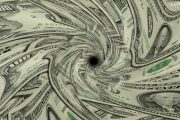
Britain’s leading financial newspaper, the London Financial Times, now believes that the U.S. economy may be headed toward a Japanese-style “Lost Decade.”
The stalling of the US recovery raises big, scary questions. After a recession, this economy usually gets people back to work quickly. Not this time … traits seen as distinctive strengths are now weaknesses, and a “lost decade” of stagnation, like Japan’s in the 1990s, might lie ahead.
The Japanese economy has experienced zero economic growth in terms of Gross Domestic Product (GDP) since 1991. In essence, the Japanese have experienced two “lost decades.”
In making the prediction for an upcoming U.S. “lost decade” from 2010 to 2020, the Financial Times has an increasing amount of company. The U.S. Conference of Mayors has just released a study that predicts the soft economy will not lift the economies of America’s urban centers for another decade. “Metro areas will be slow to regain their pre-recession employment levels — many of them into the next decade,” the U.S. Conference of Mayors (USCM) forecasted in a press release.
The document itself, U.S. Metro Economies, claims that “Forty-eight metropolitan areas (13%) are not expected to return to peak employment during this decade. These metros face the economic prospects of a “Lost Decade.” This group is primarily comprised of metro areas that were greatly impacted by the burst of the housing bubble and areas that rely heavily on manufacturing employment.”
Earlier this month, CNN/Money reported the same prediction of lackluster economic growth in the decade: “Many experts say private debt owed by households, as well as businesses, is an even bigger problem than the government debt that’s getting so much attention lately. And it won’t be solved without a difficult stretch of high unemployment and slow growth that will likely last for six or seven more years, producing America’s own version of Japan’s ‘Lost Decade.'”
And even the Wall Street Journal reported June 20 that bank stock valuations mark a “lost decade” for that industry, in a blog titled “Bank Stocks’ Low Valuation = Lost Decade, Says Bank Analyst.”
But the problem isn’t whether America is headed toward a “lost decade”; it’s whether the nation is headed for a second lost decade. The Washington Post reported in 2010 that the first decade of the 2000s yielded zero job growth. And Austrian School economist Ryan McMaken noted at the Ludwig Von Mises Institute back in April 2010 that “American median household income in 1998 (adjusted for inflation) was $51,295. Ten years later, in 2008, it was $50,303. Over the same period, household debt increased 139 percent.” McMaken then predicted, “Now come the years of de-leveraging with stagnant incomes, which will be painful.”
A little over a year into McMaken’s predictions, they have proven to have been true to form. But that has been the case with Austrian School economists across the spectrum for decades. Frederick von Hayek predicted the great depression, and that it would be an extended depression because of U.S. monetary and fiscal policy.
Indeed, Austrians predicted that Japan — now in its second lost decade — would continue to be mired in economic trouble. Benjamin Powell wrote at Mises.org back in November 2002:
Japan has experienced an Austrian business cycle. The initial boom was created by a central bank-induced monetary expansion. Because of repeated interventions, the economy has not recovered. The greatest malinvestments took place in capital-intensive industries in the earlier stages of production. For Japan’s economy to recover the government must stop intervening in the economy and allow the market process to realign the structure of production to match consumer preferences.
Of course, Japan did nothing of the sort. The Japanese central bank, the Bank of Japan, continues to suppress interest rates (they’ve been close to zero since 1992), and the Japanese government continues to pile up “stimulus” spending that has stacked the national debt up to an astonishing 200 percent of GDP. Thus, the Japanese economy has yet to recover 20 years later. Japan has experienced zero net growth in GDP since 1991, and its economy is currently in recession.
The United States has pursued precisely the same economic policies under Presidents Bush and Obama for 10 years: Federal Reserve policies that suppress interest rates to near zero, “quantitative easing,” and massive deficit spending by the federal government.
The question most Americans should ask is: Have President Obama and the Federal Reserve killed the economic recovery by copying the failed Japanese policies?



